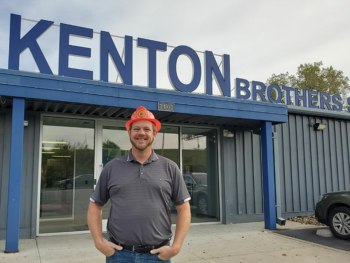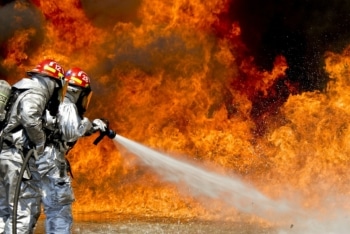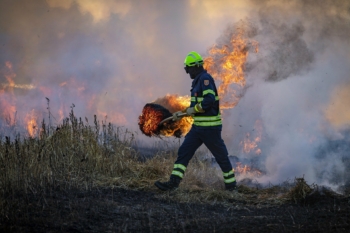Are you a firefighter at your company? Here are five coping tips.
By Neal Bellamy, IT Director at Kenton Brothers
“They call me the fireman, that’s my name.”
– George Strait
(If you don’t get the song reference… click here.)
 In my time at KB, I have always been the fireman. I spend the majority of my day solving problems for my customers both internal and external. 8 times out of 10, the problems are pop-ups. I thought I’d take a moment to share what a morning might look like for me and some coping mechanisms I use to keep my sanity.
In my time at KB, I have always been the fireman. I spend the majority of my day solving problems for my customers both internal and external. 8 times out of 10, the problems are pop-ups. I thought I’d take a moment to share what a morning might look like for me and some coping mechanisms I use to keep my sanity.
DUN, DUN 5:15 AM: Review what happened yesterday. Look at my schedule full well knowing it’s not really going to happen like that. I also read any emails that came through overnight. There’s one about the ERP that needs to get sent out to another teammate.
6:30 AM: Arrive at KB. I know this is the only part of my day that is going to go as planned SO I have a routine. Start the coffee, water my plant, take Boomer out, if he is with me. I always start the day with 3-5 things that need to get done before people start showing up at KB. Today, I have a few important, but not urgent things that need to get scheduled. I owe a client a list of parts, I need to schedule some training, I need to review other KB team’s calendars for coordination with the ERP installation (previous blog post). Review some parts for a job that we had questions about late on Friday.
6:38 AM: Get coffee. Send an email about training options for the customer. 1 thing started, 4 to go.
6:47 AM: The first fire. I remember that the microphone didn’t work last week for the tech meeting. I steal borrow the microphone from another room and set it up where the guys will be meeting. I finish just before the meeting starts. (This fire is on me, I knew I wanted to get it done, but I forgot to put it on the calendar.)
7:00 AM: Attend the tech meeting. I usually like to listen to the tech meeting. I enjoy hearing how everyone is doing, listening for areas that I can improve, and being available if there is an area I can help. I don’t run the meeting any more. Eric, Paul, and Kip do a much better job than I ever did, but I love still being connected.

While I’m listening to the tech meeting, I start working on the parts list. I determine the parts that are needed but find another related job where the wrong parts were ordered. I order the right parts, including replacing the parts ordered incorrectly, and make myself a mental note to talk to the PM. Second thing on the list is completed. I stumbled across the second fire but was able to fix it right away. I document the parts ordered in the system and parts reviewed for later installation. Sometimes reviewing the parts can open a can of worms… thankfully today it did not.
7:32 AM: I have a few moments before most people (and fires) arrive, so I take a moment to start another “Planned” task. Before I can make a parts list for a customer, a fire breaks out. I’m reminded that we need to order air filters for the building. I stop what I’m doing and order the air filters. Then I go back to the parts list.
7:38 AM: Review emails. I see I have a reply from the training scheduling and the ERP strings. I reply to any needed emails and flag the ones that need a longer answer.
8:00 AM: Find Project Manager about the parts review. Tell them what I did and what the timeline is for the new parts coming in.
8:12 AM: I have an un-planned hour, so I start reviewing quotes to make sure they are as accurate as possible. Some look great, I forward on to the salesperson. Some I have questions on and will review with the engineer later.
8:36 AM: Sales and Engineering came to ask questions about a design we did for them. I did not do the design, so I look up the quote, ask a bunch of questions and determine we made the right suggestion. I explain it to the salesperson who will then go explain it to the customer.
8:58 AM: Read emails again. I have a confirmation for training. I add it to my calendar and invite the customer and another from my team. Again, I reply to any emails and flag any that need a response.
 I’ll spare you the rest of the day, but let’s just says it has the same theme. For some people, I know the pace and interruptions might cause a person to self-implode. I certainly didn’t start with the time management skills to deal with a day full of firefighting. But I was able to develop some habits along the way to keep me sane.
I’ll spare you the rest of the day, but let’s just says it has the same theme. For some people, I know the pace and interruptions might cause a person to self-implode. I certainly didn’t start with the time management skills to deal with a day full of firefighting. But I was able to develop some habits along the way to keep me sane.
1) Always start the day with a plan.
I start every morning by reading automated reports, all of my emails from overnight, and looking at the calendar. It’s certainly not the first time I’ve looked to see what “Today” is going to be, but it’s the last reminder before the day starts. I also review my team’s notes from the previous day to see if they are stuck somewhere or I have a teachable moment that I need to capitalize on.
2) “If you can do it in less than 5 minutes, do it now.”
I’m sure someone famous said this… and there is probably a whole dogma about it. For me, I happened to hear it somewhere and took it to heart. Five minutes is longer than you think. For me, it’s, “if whatever interruption comes in and I have the information needed to solve it right now, solve it right now.” It will keep you from trying to remember to deal with it later. This includes asking others for information that you need to solve the problem. Send the email or ask the question now, giving that person time to respond.
3) If you can’t solve it, mark it for later.
Either flag your email or put it on the calendar for when you can solve it.
4) Use a priority system.
If you don’t prioritize the incoming issues, you’ll end up solving the loudest issues, which may not always be the most important. I use the Eisenhower Matrix.
5) Use downtime, even minutes, effectively.
I receive between 300 and 400 emails every day. I use the time between meetings and other downtime to review those emails. I follow the “Do it less than 5 minutes” rule for each. I don’t get many calls or texts, but If I do, I review those first.
There are firefighters at every company. They are “the fixers”. It’s part of the job that I love here at Kenton Brothers. If a few of these pointers help out a fellow firefighter, it’s just one more problem I helped fix.
Cheers to all the firefighters out there!




Leave a Reply
Want to join the discussion?Feel free to contribute!